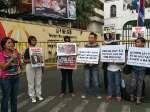 News Release
News Release
May 2, 2014
The umbrella group Bagong Alyansang Makabayan said it will block plans to give United States forces access and de facto basing opportunities in 5 Philippine military camps. The group said that once the US forces have been granted access to these locations, “it would be tantamount to ceding these areas to a foreign power that will not leave.” The use of facilities is one of contentious features of the US-PH Enhanced Defense Cooperation Agreement.
The group said that it may ask the Supreme Court to stop the Philippine government from undertaking any further negotiations and discussions with the US government on what areas in the Philippines will be considered “agreed locations” for US forces.
“The EDCA goes beyond any existing treaty we have with the United States, including the Mutual Defense Treaty and the Visiting Forces Agreement. This is a whole new ball game. Our government is now identifying areas which will effectively be ceded to US forces. On paper, we are the owners of these agreed locations, but in practice, the US will have effective operational control, including control of security over the area,” said Bayan secretary general Renato M. Reyes, Jr.
“The EDCA is unequal and therefore an affront to our sovereignty. It did not go through the required legal processes under our Constitution. It expands the basing opportunities for US troops to the entire archipelago. It shifts the burden of hosting US troops on our country, both the financial and social costs. It also grants the US immunity since no dispute can be brought to any local or international court,” Reyes added.
Among the areas being considered for use by US forces include Fort Magsaysay in Nueva Ecija, Cavite, Ilocos, Batanes and a possible naval outpost in Oyster Bay in Palawan, near the disputed West Philippine Sea.
Blast from the past
Bayan said that just because the PH negotiators say the EDCA does not provide for US ownership, extraterritoriality and exclusive use of facilities, doesn’t mean these are not bases.
“In 1965, Article XIII of the US bases treaty was amended, and the US on paper, renounced exclusive jurisdiction over on-bases offenses. In 1979, when the RP-US Military Bases Agreement was reviewed, the US bases were placed under the formal control of the Philippines, they were now US bases within Philippine facilities and were placed under a Filipino base commander. The Philippine flag also flew in these bases and the Philippine government was to provide security along the bases’ perimeter. None of these acts diminished the fact that the bases still violated our sovereignty,” Reyes said.
“Those bases provisions from the past are the exact provisions we can find in the EDCA today. Any reference to Philippine authorities having access or control over these facilities, that we are equals with the Americans, is misleading and illusory. It looks good only on paper,” Reyes explained.
“A base by any other name or agreement is still a base” he added.
Bayan says that the US basing strategy has evolved over the years. The US fiscal crisis makes it difficult for the country to maintain formal bases such as those in Clark and Subic. The US is now after flexible basing opportunities where its allies will assume the costs of hosting the troops. The key however is still permanent presence and the type of operations undertaken in these facilities.
In the official US document Sustaining Global Leadership, Priorities for 21st Century Defense, the US government laid out that “whenever possible, we will develop innovative, low-cost, and small-footprint approaches to achieve our security objectives, relying on exercises, rotational presence, and advisory capabilities.”
EDCA expands tax perks to US contractors
Bayan also called on Congress to look into the expansion of tax perks to US military contractors giving services to US forces. Article VII Sec.1 of the EDCA gives the same tax-exempt status to US contractors when it comes to the use of utilities such as water and electricity. In fact the taxes for utilities will be borne by the Philippine government according to the agreement. The EDCA defines the military contractors as those firms under contract with the US Department of Defense. “We will in effect be subsidizing even the private military contractors and help increase their profits. Why on earth will we do that? Why make the Filipino people subsidize these private businesses?” Reyes asked.
The tax perks for US contractors is a new feature in EDCA not found in the previous Visiting Forces Agreement. In fact the VFA makes no mention of private defense contractors at all.
US defense contractors such as Huntington Ingalls, the biggest builder of US aircraft carriers and nuclear submarines, now operates in Subic to service US ships. ###













